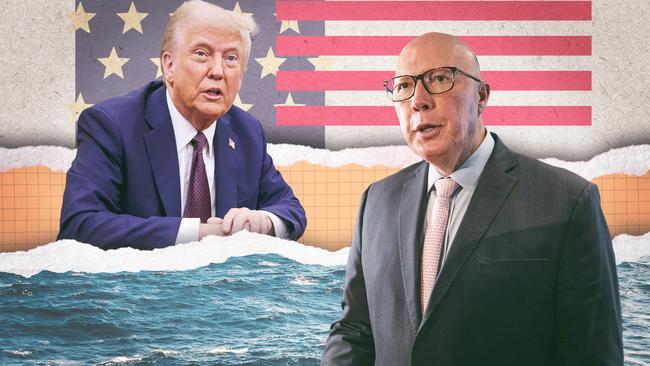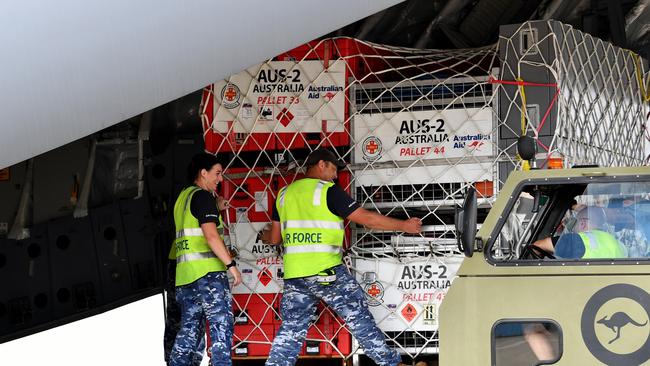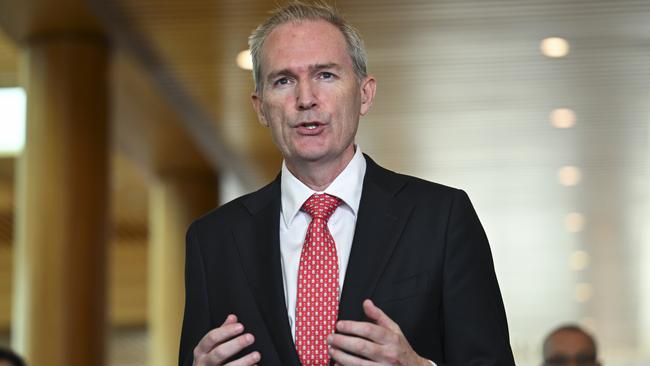Coalition vow: more Pacific infrastructure loans to undercut Beijing
Peter Dutton is moving to distance himself from Donald Trump’s foreign aid cuts, pledging an extra $2bn in Pacific infrastructure loans to counter surging Chinese influence.

Peter Dutton is moving to distance himself from Donald Trump’s foreign aid cuts, pledging an extra $2bn in Pacific infrastructure loans to counter surging Chinese influence across the region.
Coalition foreign affairs spokesman David Coleman said a Dutton government would lift the Australian Infrastructure Financing Facility for the Pacific’s loans ceiling from $3bn to $5bn to deliver a raft of economy-strengthening projects.
The move comes as Beijing looks to take advantage of the Trump administration’s decision to axe USAID support for the developing world, including $388m a year for Pacific countries.
It’s understood the Department of Foreign Affairs and Trade has been modelling the impact of Australian foreign aid cuts in case a Dutton government decides to mimic the Trump policy.
However, a senior Coalition source said there would be no reduction to development assistance for the Pacific in its final election costings to be released on Thursday.

Mr Coleman said more Australian-funded loans to Pacific countries would undercut efforts by Australia’s adversaries to win over regional leaders.
“Infrastructure financing has become yet another battleground for influence in our region,” he said. “A larger AIFFP under a Coalition government will work to further strengthen Australia’s partnerships with nations across the Pacific and Timor-Leste.
“It will complement the defence, security and other economic ties which were at the core of the Coalition’s Pacific Step-up when last in government.”
The AIFFP so far has issued about $1.1bn in loans, which would leave nearly $4bn available for new ports, airports, energy and telecommunications projects if the Coalition is elected.
The Opposition Leader named China in Sunday’s leaders’ debate as the biggest threat to Australia’s national security.
“The biggest concern from our intelligence agencies and defence agency is in relation to the Communist Party of China, and they’re worried about conflict in our region,” he said.
“They’re worried about what that would do to … our trade, what it would do for our security settings, what we would need to do to respond to say a cyber attack on our country.”

Anthony Albanese said Beijing was seeking “to increase its influence in the region” but would not explicitly name China as a threat to the nation’s security. “I am the Prime Minister of a country and how you deal as prime minister is diplomatically, and that is what we continue to do,” he said.
Labor has pilloried the Pacific diplomacy of past Coalition governments, which was marred by fights over climate change and unguarded comments by Mr Dutton in 2015 in which he joked about rising sea levels.
“Every Pacific leader remembers him joking about water lapping at their doors,” Mr Albanese said last week. “For the Pacific Island neighbours, it’s not a joke, climate change, it’s something that is the entry fee to credibility in our region.”
Labor also blasted Coalition failures to head off China’s security agreement with Solomon Islands.
China has expanded its regional influence during Mr Albanese’s prime ministership, striking policing agreements with Vanuatu and Kiribati, and a strategic partnership agreement with the Cook Islands.
“The Pacific, and other near neighbours like Timor-Leste, must be at the core of Australian foreign policy,” Mr Coleman said in a recent foreign policy speech.
Development Intelligence Lab chief executive Bridi Rice said the withdrawal of US aid dollars, a looming reduction in US diplomatic posts and the Trump administration’s tariffs would deliver a blow to regional stability.
“For Australia, this may mean rising development costs without US co-funding, including on infrastructure,” she said. “More dangerously, it risks leaving a vacuum where populism, corruption and authoritarianism can flourish. Australia has no choice but to recalibrate.
“Regional development is now the frontline of diplomacy and national security, and we cannot afford to sit back.”




To join the conversation, please log in. Don't have an account? Register
Join the conversation, you are commenting as Logout